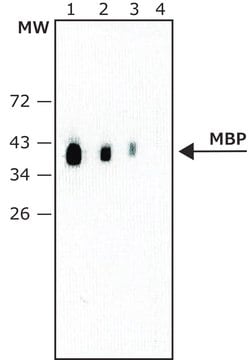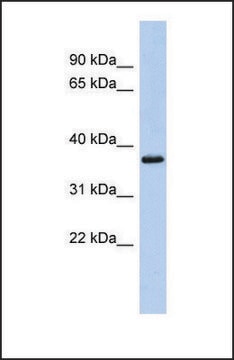M9434
Monoclonal Anti-Myelin Basic Protein (MBP) (36-50) antibody produced in rat
clone 14, tissue culture supernatant
Synonym(s):
Anti-MBP
About This Item
Recommended Products
biological source
rat
Quality Level
conjugate
unconjugated
antibody form
tissue culture supernatant
antibody product type
primary antibodies
clone
14, monoclonal
contains
0.09% sodium azide
species reactivity
horse, chicken, human
technique(s)
ELISA: suitable
immunofluorescence: suitable
immunohistochemistry: suitable
isotype
IgG
UniProt accession no.
shipped in
dry ice
storage temp.
−20°C
target post-translational modification
unmodified
Gene Information
human ... MBP(4155)
General description
Specificity
Immunogen
Biochem/physiol Actions
Preparation Note
Disclaimer
Not finding the right product?
Try our Product Selector Tool.
Storage Class Code
10 - Combustible liquids
Certificates of Analysis (COA)
Search for Certificates of Analysis (COA) by entering the products Lot/Batch Number. Lot and Batch Numbers can be found on a product’s label following the words ‘Lot’ or ‘Batch’.
Already Own This Product?
Find documentation for the products that you have recently purchased in the Document Library.
Our team of scientists has experience in all areas of research including Life Science, Material Science, Chemical Synthesis, Chromatography, Analytical and many others.
Contact Technical Service








